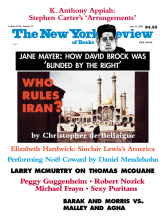To the Editors:
Joyce Carol Oates’s answer to the question implied in the title of her review [“How to Read ‘All the King’s Men,'” NYR, March 28] seems to be: read the old one, the one we are all familiar with. She is, of course, entitled to her opinion of the new “restored” edition of Robert Penn Warren’s best novel, but one could wish for a more reliable, a more useful, aesthetic standard than familiarity, especially with a novel that she finds severely deficient to begin with. She rests her arguments against the “restored” text on a couple of the more trivial differences that the original editors effected in the text and not on the cumulative effect of all the changes on Jack Burden’s character and the novel’s themes, which are intimately entwined. My editorial afterword deals with issues considerably more complex; Ms. Oates reduces the many major differences to a couple of simple ones. Again, she overlays the restoration with the old familiar Jack whom she prefers.
Likewise her preference for the old Willie Stark over the restored Willie Talos. Warren composed All the King’s Men with the name “Talos” as its cornerstone; it was in his mind as he wrote. The original editors’ arguments for changing the name had nothing to do with literary matters but rather with matters economic and political; her dismissal of the name as inferior patronizes the author and his years of work on this novel, which many believe to be among the best written by an American in this century.
Those who want to read editors instead of authors can certainly do so, but in the case of the 1946 All the King’s Men they will read, have been reading, a book edited by a man who didn’t like the novel’s Cass Mastern episode, for example, which readers and critics have for half a century now thought to be among Warren’s best sustained narratives; the typescript provides evidence of the numerous ways in which the original editors simply didn’t understand the novel they were editing; they created problems because they didn’t.
Many of us are interested in more than a good read. We think that authors worth reading and studying are worth recovering and studying in their pristine state, let the aesthetic chips fall where they may. Ms. Oates is correct that good editors sometimes improve books. But it is she who is “naive” about relations between authors and editors, not I, since I know how often well-intentioned commercial editors have altered novels for the worse and obviously she does not.
Noel Polk
Professor of English
University of Southern Mississippi
Hattiesburg, Mississippi
Joyce Carol Oates replies:
Since I had not read All the King’s Men for perhaps twenty years, Robert Penn Warren’s original text was no more familiar to me than the “restored” text provided by Noel Polk. My reading of the two editions was in tandem, which was the only way to note Mr. Polk’s “corrections” of the original text. As I indicated in my review, the 1946 text, for all its flaws, is superior to the “restored” text, which primarily restores distracting stylistic tics and the self-consciously mythic name “Willie Talos,” which Warren had dropped in favor of the more plausible “Willie Stark.” That Robert Penn Warren, novelist, poet, essayist, and shrewd literary critic, not only approved the original 1946 edition of his most famous novel but oversaw numerous reprintings through the decades, including a special 1963 edition published by Time Inc. with a preface by the author, and did not “restore” any of the original manuscript, and did not resuscitate “Willie Talos,” is the irrefutable argument that the 1946 edition is the one Warren would wish us to read. That Noel Polk should make a project of “restoring” a text in this way, and that this text should be published to compete with the author-approved text, is unconscionable, unethical, and indefensible.
This Issue
June 27, 2002



